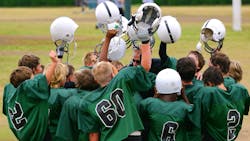From Gridiron to Boardroom: Football Teaches Leadership
IndustryWeek's elite panel of regular contributors.
Over the last month, I have spent a lot of time on the football field sidelines. Both of my boys are playing. Therefore, I am doing my best to learn the game: the players’ positions, the offensive and defensive plays, the penalty calls. In addition, I am working to get to know all the players and parents so I can cheer these young men on. The learning curve is steep!
The more I have learned about the game, the more I have realized a football team has a lot in common with a business organization.
For instance, I assumed the boys’ coach had all the answers; that he would know just the right calls to make for the team to win the game. The fact of the matter is, he doesn’t. He needs to make a quick decision that he feels is best in the moment and keep the team moving down the field toward scoring to win the game.
Business leaders don’t have all the answers either. The playbook is a strategy that they plan to move them towards the business’s vision. Their sidelines are the company’s mission and core values.
Then, there are the players themselves. Some love the game and give it their absolute best. Some are playing because their parents want them to. Sound like any of your business’s team members?
However, the most fascinating part of watching the team is studying the different team behaviors that come forward during the coaching process, and coming away with leadership lessons that can be applied to running a business.
Training Camp: Practice, Improve, Reflect, Repeat
For weeks before the team ever plays a game, players learn the fundamentals and strengthen their muscles. The coach breaks down practice into focus areas where players develop agility skills and condition their bodies to the environmental elements, such as heat and humidity. In addition, the players learn new offensive plays. And, as you would expect, coaches teach players to properly block and tackle on defense.
How do you spot the best players during training camp? The best want it more. You will be able see their hard work and feel their desire. Practice, improve, reflect, repeat will be their personal mantra.
Competition does not scare them, as they understand that “iron sharpens iron.” That is not to say they will not be nervous. The best are willing to be uncomfortable because they understand growth only happens outside of their comfort zone. In business, we say they are “coachable.”
Locker Room: Building Culture
Jon Gordon and Mike Smith wrote a book entitled, “You Win in the Locker Room First.” Their theory is that X’s and O’s are overrated. It will not matter how many talented players you have on the team. Smith, a retired NFL coach, says, “It is your culture that will be the driving force to create the resiliency, toughness, passion and attitude to overcome the obstacles in your way.”
Are the players serving one another? Or, are they blaming each other? I love to see the players pat each other on the helmet or literally lift a hurt player up off the field. This is especially important if the player made a mistake. It’s all right. Shake it off and get back out there.
When they were losing the game, did they fight all the way to the whistle? Or, did they give up before the game was over? As a business leader, we have to keep the team focused on the long-term goal, even when the play didn’t go our way. You must fight all the way to the end and never give up.
On the Field (and After the Game): Encouragement and Resilience
At first, I was shocked to see the coaches grab the players by the facemask on their helmets. Then, I realized the coach wasn’t berating the player for a missed play. Instead, they were congratulating them on a play well done or giving them words of advice or encouragement. By holding their facemask, the coach has the player’s full attention.
After a loss, players beat themselves up for what went wrong. A coach’s job is to help them identify what went well. Let the players have a moment to sulk, but quickly begin planning for the next game.
Football is a mental game. Like Ted Lasso says, “Be a goldfish.” After a bad play or call by the referee, the players must have a short memory and shake it off. Get back out on the field and make the next play.
In business, leaders must help their team prepare mentally as well. Change is constant in the business world. Just when you think you have the strategy figured out a major shift happens. Maybe it is a global pandemic, financial crisis or the loss of a major client. Have you prepared your team to be resilient? Do you look them in the eye and say, “We got this!”
In this season, how are you coaching and serving your team?
Ashleigh Walters was president of Onex Inc. through 2022 and is the author of Leading with Grit and Grace.
***To comment on this article, please scroll down past story recommendations to "Voice Your Opinion."

